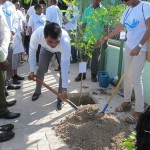350.org has posted an online petition on its site to support President Mohamed Nasheed’s survival pact, announced at the Vulnerable Climate Forum, last week.
At a congregation of 11 of the world’s most climate vulnerable countries, the president invited participants to choose survival over suicide and commit to drastic cuts in emission at the landmark UN climate change conference in Copenhagen this December.
“At the moment every country arrives at the negotiations seeking to keep their own emissions as high as possible. They never make commitments, unless someone else does first.
“This is the logic of the madhouse, a recipe for collection suicide. We don’t want a global suicide pact…So today, I invite some of the most vulnerable nations in the world, to join a global survival pact instead.”
In an email to Minivan News today, Bill McKibben, the man behind the 350 campaign, which is calling for reduction of atmospheric carbon dioxide to 350ppm, said they had received tens of thousands of signatures in support of the pact.
On the speech, McKibben said, “I thought it was the best speech by a head of state about climate change in the 20 years I’ve been working on the issue. Finally someone dropped the language of political convenience and replaced it with the language of scientific necessity.”
Over on Nasheed’s Facebook page, readers have praised his speech.
“Thank you President Nasheed for having the courage to tell it like it is,” said Laura Lamond, while Susan Blayney from Canada said the speech moved her to write to her MP.
Bruce William Oswell Haynes wrote that the speech was the “most powerful use of the spoken word I have heard for a long time.”
On the V-11 summit, McKibben said it showed that most vulnerable nations would “not go quietly to the gallows”.
“It set them up to be the moral leaders at Copenhagen and beyond. Far more than the big global environmental groups, these nations now represent the cutting edge of the debate.”
Although the climate change talks are less than a month away, negotiations have virtually reached a standstill.
At the last round of negotiations in Barcelona, Spain, earlier this month, the divide between rich and poor countries remained more pronounced than ever.
While the developing world are demanding broad cuts in emissions from the developed world, the latter are reluctant to commit. Another issue of contention is how much aid rich countries should given poorer ones to help them adapt to climate change.
In the declaration signed at the V-11, participants agreed to show moral leadership and begin the process of greening their economies but stopped short of committing to going carbon neutral.
In March, Nasheed announced his intention to make the Maldives the first carbon-neutral country in the world and at the summit, called on other countries to join him.
Other countries at the summit included Bangladesh, Nepal, Vietnam, Kiribati, Barbados, Bhutan, Ghana, Rwanda and Kenya.
Although they are among the lowest emitters of greenhouse gas emissions in the world, they share between them the worst impacts of climate change including desertification, drought, floods, storm surges and vulnerability to sea level rise.
The declaration further called for cuts in emissions that would ensure global temperatures remained below 2.5 degrees celsius above pre-industrial levels and that atmospheric carbon dioxide was returned to the safe threshold of 350 ppm.
On 24 October, 350.org led a world-wide protest for this reduction in carbon dioxide levels. People in 181 countries participated by holding over 5,200 events.
McKibben told Minivan News the campaign would now help organise a series of candlelight vigils around the world on 12 December, especially targeted at US embassies and consulates.
“It has become clear that even in the age of Obama, the United States still represents the fundamental roadblock to change,” he said.
To sign the Survival Pact click here.
{http://action.350.org/p/dia/action/public/?action_KEY=1711}





